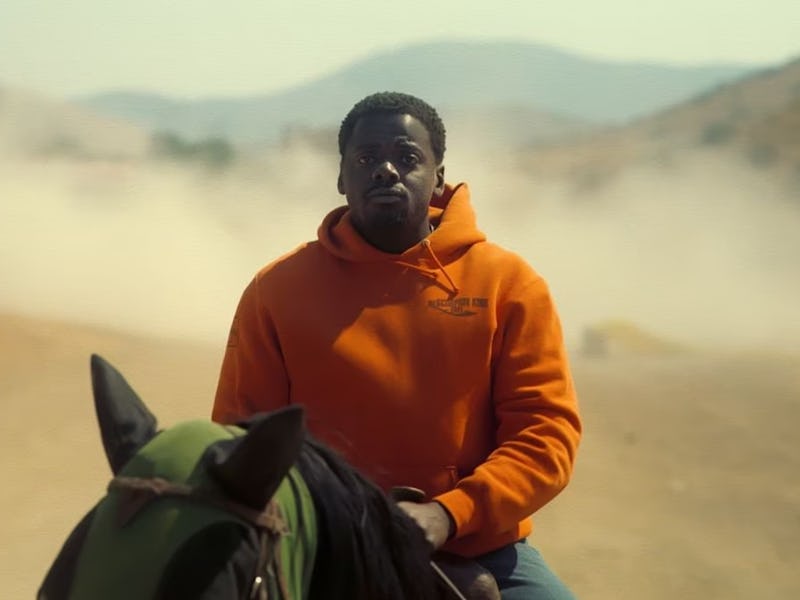Nope Was Snubbed By the Academy Awards. Maybe That’s Fitting.
You don’t need an award when you have this much spectacle.

This year’s Academy Awards were, among other things, another celebration of genre filmmaking, a recent trend that’s already included a romance from the Black Lagoon and a homicidal story of upwards mobility. Everything Everywhere All At Once deservedly took home the night’s highest honor, while other nominations reflected 2022’s cinematic variety. For the first time in a while, it felt like the Oscars were letting some new blood trickle in... but in a year filled with so much audacious filmmaking, there were some notable omissions.
That’s to be expected. Before The Shape of Water, the last time anything resembling an immersive genre picture won Best Picture was 2003’s The Return of the King. Fans of pulp cinema have learned to appreciate the oddities left untouched by the awards spotlight. But in the case of Jordan Peele’s Nope, a bold and breathtaking adventure with so much to say about the magic of the movies, it’s a head-scratcher.
Nope runs two of pop culture’s neverending fascinations through a post-modern meatgrinder: UFOs and the American West. The idea of a sinister alien presence sucking unwitting horses and humans into the sky above Agua Dulce, California feels like it could be the premise of an old EC Comics story, yet Peele’s sharp pen grounds the entire affair in the richness of human drama. It’s a movie that feels fresh despite wearing influences like Jaws on its sleeve.
It also carries the spirit of the Hollywood western in its humble adventurers. As descendants of the Black jockey in the seminal “The Horse in Motion,” Emerald (Keke Palmer) and OJ Haywood (Daniel Kaluuya) should be film royalty, yet the unexplained passing of their father leaves them saddled with the debts of his Hollywood horse training business. Palmer is frenetic and high-spirited, while Kaluuya is brooding and soft-spoken, but their relationship is effortlessly earnest and reflective of one of the Wild West’s most persistent archetypes. Emerald and OJ are the lonely nomad; the looming loss of their childhood ranch means their mission to document evidence of the alien phenomena in the area is really a mission to lay roots in a tangible future.
Helping them document the unfilmable are a host of eccentric and lively side characters, from the overfamiliar and easily excitable Angel Torres (Brandon Perea), to the gravelly voice and shrewd eyes of seasoned and secretive cinematographer Antlers Holst. On the flip side, Steven Yeun’s brief but unforgettable turn as Ricky “Jupe” Park, a former child star who survived a brutal chimp attack on the set of a late ‘90s sitcom, is a fascinating look at our obsession with the sensationalization of celebrity trauma.
Albeit in the context of angry monkey attacks.
There are so many moving parts that, in the hands of a less seasoned director, Nope would fall apart in spectacular fashion. Instead, it’s incredible to see how confident and evocative Peele’s direction has become over just three movies. The film weaves seamlessly between quiet moments of intimacy and grotesque setpieces, like the mesmerizing “blood umbrella” scene where the brutal UFO rains carnage down over the Haywood ranch house. It’s a staggering technical achievement in a movie already full of them, and a testament to the fact that a great director can only soar as high as his collaborators will allow.
The movie’s cinematography emphasizes the bountiful expanse of California’s vast landscape, but it also brings terrifying clarity to the night skies above Agua Dulce, courtesy of cinematographer Hoyt van Hoytema. The sound editing is horrific and visceral, contrasted by the vivid musical stylings of Michael Abels, who coats the film in a textured blanket of ‘70s funk, terse horror spaciness, and Western horns and trumpets. The total lack of recognition on the part of the Academy is even more bewildering when you consider the three Oscars that Jaws won back in 1976: Best Editing, Best Sound Mixing, and Best Original Score.
Nope has a lot on its mind, but it’s also a technical masterpiece.
Then again, the movie is about those who have been ignored by the lights and prestige of the industry. Horror as a genre has been a tough sell, and on an individual scale, Hollywood overlooks the importance of below-the-line grunts like animal trainers, camera ops, and stunt performers, the same people who make up Nope’s core of heroes. There’s an entire history of forgotten pioneers, like the nameless Black jockey immortalized on film. When Emerald declares defiantly that she “remembers the little Black boy” who starred alongside Little Jupe on the TV show that made him famous, Peele is making a sorrowful reflection on how an institution that he loves continues to erase people like him.
While a lack of awards doesn’t erase the ingenuity on display, it’s certainly ironic considering the Academy’s newfound appreciation for genre filmmaking. At the same time, it’s in the spirit of the awards business to pass on this kind of incisive artistic expression. No one understands this better than Peele himself, who wasn’t concerned with appealing to Hollywood’s vanity. He was too busy crafting a “weird” Western epic that honors the legacies of cinema’s invaluable Black pioneers, while taking a magnifying glass to the bleeding contradictions at the heart of the industry.